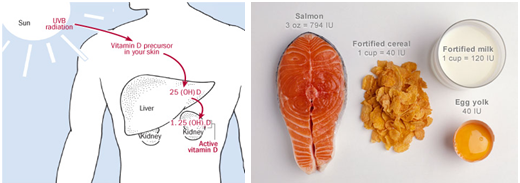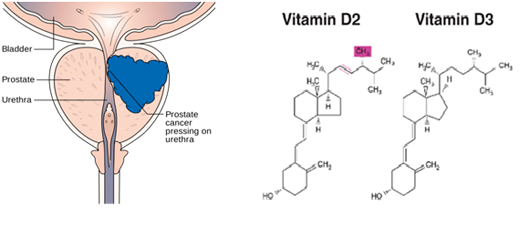“Aggressive prostate cancer caused by vitamin D deficiency” scientists now declare

Men with suboptimal or deficient levels of vitamin D are much more likely than other men to develop prostate cancer, according to a new study conducted by the U.S. National Institutes of Health (NIH). Researchers from NorthwesternUniversity ,Chicago found that vitamin D deficiency can increase the risk of aggressive prostate cancer in some men, highlighting the need for increased focus on natural sunlight exposure and supplementation.

The study, published in the journal Clinical Cancer Research, suggests that vitamin D may play an important role in how prostate cancer starts and spreads, although it does not prove a cause-and-effect relationship. Vitamin D seems to regulate normal differentiation of cells as they change from stem cells to adult cells. And it regulates the growth rate of normal cells and cancer cells
The research was based on an assessment of more than 600 men from around the Chicago area who came from varying ethnic backgrounds. Each of the men had elevated PSA levels or some other risk factor associated with prostate cancer going into the study, and each was evaluated for vitamin D deficiency prior to undergoing a prostate biopsy.
After adjusting for external factors that may have influenced the results, including things like diet, obesity, smoking status and family history, the researchers determined that vitamin D levels are inversely associated with prostate cancer risk. This means that, for each unit of decrease on the vitamin D scale, there is a corresponding increase on the prostate cancer risk scale, and this increase is even more pronounced among certain ethnic groups.
Vitamin D deficiency is more common and severe in people with darker skin and it could be that this deficiency is a contributor to increased incidence of prostate cancer and cancer progression among African-Americans.Vitamin D deficiency could be a biomarker of advanced prostate tumor progression in large segments of the general population.
The latest prostate cancer discovery demonstrates the need to pay closer attention to vitamin D intake.Vitamin D, the sunshine vitamin is an essential Vitamin that is a part of the steroid hormone superfamily.Hormone sources include both dietary intake and conversion from an inactive to active Vitamin D in the skin through sunlight exposure.

Most foods that contain vitamin D only have small amounts, so it’s almost impossible to get what your body needs just from food. Because there are only small amounts of vitamin D in food there are only two sure ways to get enough vitamin D:” “Exposing your bare skin to sunlight to get ultraviolet B (UVB)” and taking vitamin D supplements.”Normal vitamin D levels are in the range of 30 to 80 nanograms per milliliter (ng/ml).
VITAMIN D AS A DETERMINANT OF PROSTATE CANCER RISK ALSO COMES FROM SEVERAL EPIDEMIOLOGIC OBSERVATIONS:
1. Men living in Northern latitude with less exposure to sunlight-derived UV exposure, have a higher mortality rate from Cancer Prostate.

2. Prostate Cancer occurs more frequently in older men, in whom Vitamin D deficiency is more common both because of less UV exposure and age related declines in hydroxylases responsible for synthesis of active Vitamin D.
3. African-American, whose skin Melanin block UV radiation and inhibit activation of Vitamin D, has the highest worldwide incidence and mortality rates for Prostate Cancer.
4. Dietary intake of dairy products rich in calcium, which depresses serum level of Vitamin D, is associated with higher risk of Prostate Cancer.
5. Native Japanese, whose diet is rich in Vitamin D derived from fish have a low incidence of Prostate Cancer.
It is recommended that more men should be screened for vitamin D deficiency, since minor deficiencies can be asymptomatic. A good rule of thumb for health maintenance is to spend at least 15 minutes out in the sun every day without sunscreen during the summer, or to supplement with at least 5,000 international units (IU) of vitamin D3.
Dr. Shameer Hameed
MBBS, MS (General Surgery),Dip Lap, MCH (urology)
Specialist Urologist
